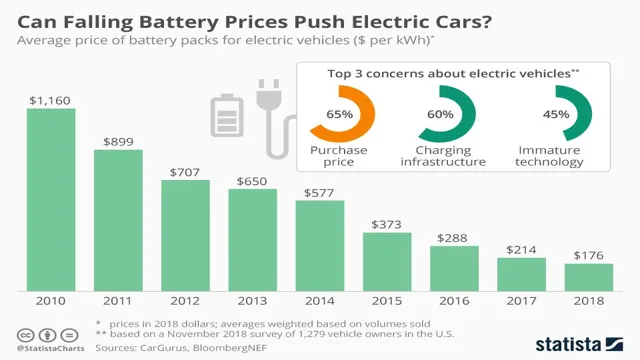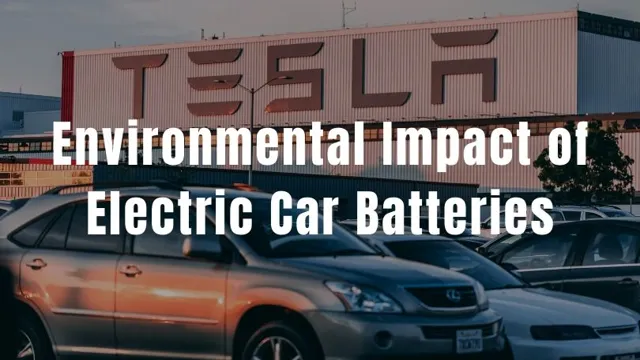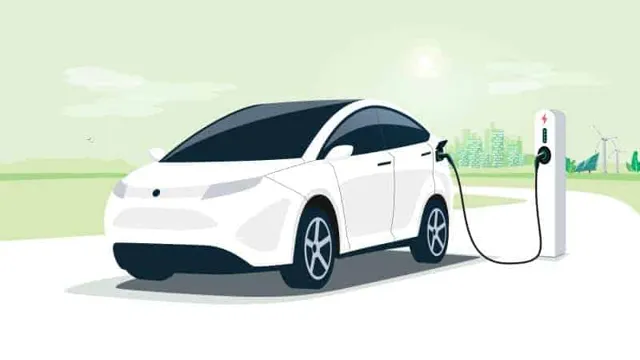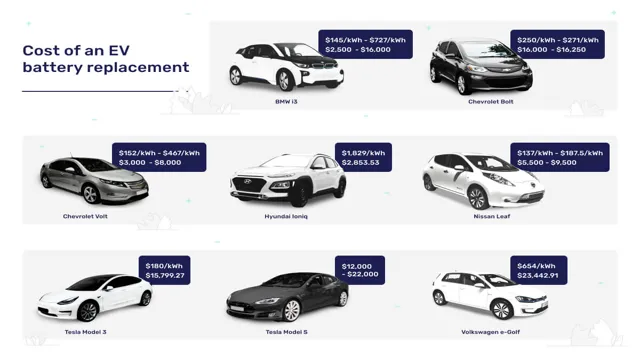The Shocking Truth About Battery Costs for Electric Cars: How to Save Money and Make the Switch
Electric cars are a sustainable mode of transportation, reducing carbon emissions while preserving the environment for future generations. However, the high cost of electric car batteries has been a significant barrier to widespread adoption of these cars. As consumers increasingly consider electric cars, the cost of the batteries is one of the most critical factors they evaluate.
Many people are left to wonder how expensive electric car batteries cost and how they differ from traditional gas-powered vehicles. In this blog, we will break down the cost of electric car batteries, how they are manufactured, and how they contribute to the overall cost of an electric car.
Why battery cost matters
The cost of a battery is one of the main factors that determines the affordability of electric cars. While electric vehicles are known for their environmental benefits and low running costs, the upfront price can still be quite steep. This is largely due to the high cost of battery production and the complex technology required to power an electric car.
However, as battery technology advances and economies of scale are achieved, the cost of batteries is expected to come down. In fact, some experts predict that electric cars will be cheaper than petrol cars by the mid-2020s. This will not only make them more accessible to the average driver, but it will also help to reduce carbon emissions and improve air quality in our cities.
So, the next time you’re in the market for a new car, consider the cost of the battery and the long-term benefits of going electric.
Impact on vehicle cost
One of the most critical factors affecting the affordability of electric vehicles is battery cost, and it’s essential to understand why. The battery represents a substantial portion of the vehicle’s overall cost, making up about a third of the total price. So, the more expensive the battery, the more expensive the car becomes.
This is because battery technology is still relatively new, and the production processes are not yet efficient due to the low volume production of these batteries. However, battery costs are dropping rapidly, and we can expect prices to continue to decrease as the market grows and technology advances. For this reason, manufacturers are working hard to develop cheaper, lighter, and more efficient batteries to make electric cars more affordable for a broader range of customers.
As battery prices continue to fall, it’s only a matter of time before electric cars become more cost-competitive with their gasoline-powered counterparts.
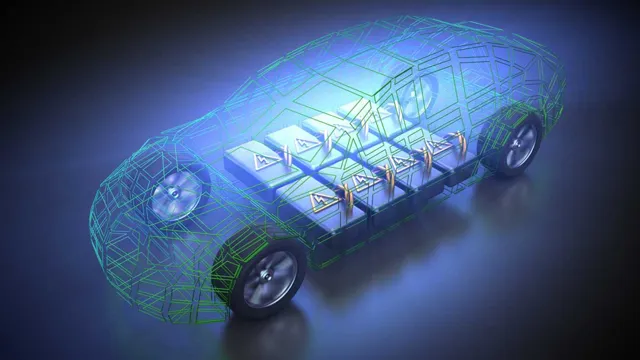
Long-term savings potential
Long-term savings potential for batteries is highly dependent on the cost of the battery itself. With battery costs decreasing in recent years, more and more industries are transitioning to battery-powered solutions. From electric cars to renewable energy storage, the affordability of batteries is becoming a key factor in the decision-making process.
The cost of batteries influences the long-term savings potential because it affects the overall cost of the system. A higher upfront cost for a battery-powered system may pay off in the long run as it could provide significant savings on energy costs and maintenance expenses. In the end, a battery’s cost has a direct impact on its potential return on investment.
This is particularly important for businesses looking to invest in energy storage solutions for their operations. By reducing their reliance on the grid and generating their electricity, companies can potentially save thousands of dollars in energy bills. Therefore, it’s essential that battery manufacturers continue to prioritize reducing battery costs to make renewable energy more accessible to all.
Factors affecting cost
When it comes to electric cars, one significant factor that determines the overall cost of the vehicle is the battery cost. Batteries are crucial components that store and supply the energy needed to power an electric car. Thus, their cost plays a significant role in the final price of an electric vehicle.
The battery cost can be influenced by various factors, including the size of the battery, the type of battery chemistry used, and the manufacturing process. Generally, the larger the battery, the more expensive it is. Different types of battery chemistries have varying costs, with some being more expensive than others.
Additionally, the manufacturing process can affect the cost of the battery. If the manufacturing process is complicated, the cost of producing the battery will be higher. Thus, manufacturers aim to develop more efficient and cost-effective battery production processes.
In conclusion, several factors contribute to the overall cost of the battery in an electric car, and manufacturers strive to find ways to reduce this cost to make electric vehicles more affordable to consumers.
Battery size and capacity
When it comes to the cost of your electric vehicle’s battery, there are a few key factors at play. One of the most important is the size and capacity of the battery itself. Larger batteries with more capacity will generally cost more than smaller ones.
This is because they require more materials and resources to produce and can hold more energy, making them more valuable. However, the cost per kWh of a larger battery decreases as its size increases, making it more efficient and cost-effective in the long run. Other factors that can affect the cost of your EV’s battery include the type of chemistry used, the manufacturing process, and any additional features or technologies included in the battery.
Regardless of these factors, an electric vehicle is still a wise investment for those looking to reduce their carbon footprint and save money on gas in the long term.
Materials and production methods
When it comes to materials and production methods, there are various factors that can affect the cost of production. Some of these factors include the type of materials used, the quantity of materials required, and the production process itself. For example, materials that are rare or difficult to obtain may cost more, driving up the overall cost of production.
Similarly, a complex production process that involves multiple stages and specialized machinery may require more resources and ultimately increase the cost. Additional factors like labor costs, overhead expenses, and market demand can also have an impact on production costs. However, it’s important to note that cheaper materials or production methods may not necessarily lead to lower costs in the long run.
In some cases, investing in high-quality materials and processes may result in better products that outlast cheaper alternatives, ultimately leading to greater value for both producers and consumers.
Supply and demand dynamics
When it comes to the cost of goods and services, the basic principle of supply and demand determines the price. Simply put, if there is high demand for a product or service with limited supply, the price will naturally increase. Conversely, if the supply of a product is abundant, but there is minimal demand, the cost will decrease.
However, there are several other factors that can impact the overall cost of goods and services, such as production costs, taxes, and regulations. Additionally, external factors like global events, technology advancements, and market competition can also affect the cost. In essence, understanding the relationship between supply and demand is just the beginning, as numerous other variables can contribute to price changes in the market.
As consumers, it’s essential to be aware of these factors to make informed purchasing decisions and get the best value for our money.
Comparing current prices
Battery cost is one of the most significant hurdles for electric vehicle adoption. However, with technological advancements and increasing demand, the cost of batteries for electric vehicles has significantly reduced over the years. In 2010, the average cost of a lithium-ion battery pack for an electric vehicle was around $1,100 per kilowatt-hour (kWh).
But now, the cost has reduced to around $137 per kWh. This drop in price has made electric vehicles more affordable and competitive with conventional gas-powered cars. Additionally, battery costs are expected to continue to decline in the foreseeable future with the increasing adoption of electric vehicles, which will stimulate the demand and production of batteries, eventually reducing the battery cost further.
Tesla vs. Chevrolet Bolt
When it comes to electric cars, two models that have been gaining attention are the Tesla and Chevrolet Bolt. One important factor to compare is their current prices. The Tesla Model 3 Standard Range Plus starts at $38,190, while the Chevrolet Bolt has a starting price of $31,99
However, it’s important to note that the Model 3 has a longer range of 263 miles per charge compared to the Bolt’s 259 miles per charge. Additionally, Tesla offers an extensive Supercharger network for its vehicles, allowing for faster and more convenient charging on long road trips. Ultimately, the decision between these two cars may come down to personal preference and budget, but it’s clear that both offer impressive features and options for those interested in transitioning to electric vehicles.
Costs for other popular models
When it comes to buying a new car, price is often a deciding factor. While the latest models always come with a higher price tag, it’s worth considering older models that may still have the features you’re looking for. For example, the current price for a 2021 Toyota Camry ranges from $25,370 to $36,070, depending on the trim level and features.
On the other hand, a 2018 model of the same car can be found for around $20,000, saving you a considerable amount of money. Another popular car on the market is the Honda Civic, with a starting price of $21,050 for a 2021 model. However, a well-maintained 2017 Honda Civic can be purchased for around $15,000.
Ultimately, it’s important to weigh the benefits of purchasing a new model versus an older one that may have the same features at a lower cost.
Future trends in battery costs
Battery costs for electric cars are currently one of the biggest factors affecting the affordability and adoption of electric vehicles. However, there is good news. Future trends suggest that battery costs will continue to decrease in the coming years, due to advancements in technology and economies of scale from increased production.
Specifically, some estimates predict that battery costs could drop by as much as 50% by 2030, making electric vehicles much more accessible to the general public. Additionally, new battery chemistries, such as solid-state, are being developed and tested, and could potentially lead to even further reductions in cost. However, it is important to note that while battery costs are a significant aspect, they are not the only factor in determining the cost and feasibility of electric vehicles.
Government incentives and infrastructure investments will also play a crucial role in the continued growth and adoption of this technology.
Conclusion
In conclusion, the cost of batteries for electric cars can certainly put a dent in your wallet. However, with advancements in technology and increased production, the prices are steadily decreasing and helping to make electric cars a more accessible option for the average driver. So, don’t let the cost of batteries shock you – invest in the future of sustainable transportation and join the electric revolution!”
FAQs
How much does it cost to replace the battery in an electric car?
The cost of replacing the battery in an electric car can vary depending on the make and model of the car. On average, it can cost anywhere from $3,000 to $10,000.
How long does the battery last on an electric car?
The battery life on an electric car can vary depending on the make and model of the car. On average, most electric car batteries last between 8 to 10 years or around 100,000 miles.
Are electric car batteries expensive to maintain?
Electric car batteries are typically less expensive to maintain than traditional gas-powered cars because there are fewer moving parts. However, if the battery needs to be replaced, it can be costly.
Are there any government incentives for buying an electric car?
Yes, many governments around the world offer incentives for purchasing an electric car, such as tax credits or rebates. These incentives can help offset the cost of buying an electric car and make it more affordable.
